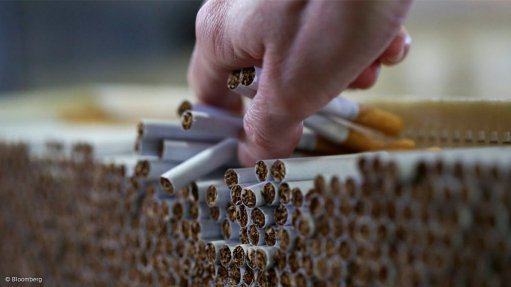
Photo by: Bloomberg
As the date nears for the start of the first court case challenging the ban on the sale of cigarettes during lockdown, the state has argued that economic costs of lost tax are "outweighed by the harms of allowing continued sales," given the health risks smoking poses during the coronavirus pandemic.
The sale of cigarettes was banned at the start of the nationwide lockdown in late March. This ban was extended under Level 4, and again under Level 3 of the lockdown. It still remains in place.
In defending the ban, the government has argued that emerging research shows smoking leads to more severe cases of Covid-19, and the prohibition is necessary to reduce strain on SA's health system.
In May the Fair Trade Tobacco Association, whose members include Carnilinx and Gold Leaf Tobacco, launched a court challenge to have the ban lifted and the sale of cigarettes and tobacco products reauthorised. British American Tobacco South Africa (Batsa), the country's largest cigarette manufacturer, has initiated separate legal challenge to have the ban undone.
In the state's latest affidavit Minister of Cooperative Governance and Traditional Affairs, Dr Nkosazana Dlamini-Zuma, argues that lost revenues from sin taxes are not reason enough to overturn the ban.
"It was decided that any economic costs were outweighed by the harms of allowing the continued sale of tobacco products during Level 4," she states.
"If tobacco use gives rise to more people with a more severe form of Covid-19, this generates additional health care costs," she says, adding that even without Covid-19, the healthcare costs associated with tobacco are "enormous".
Batsa, in its submission, estimates the fiscus lost out on roughly R2.4-billion in excise taxes during the first eight weeks of lockdown.
Dlamini-Zuma also argues that the court will not have to rule on whether emerging scientific evidence clearly backs the state's case of the ban. Rather, she argues that the court will have to decide "simply whether the literature provides a rational basis for the prohibition".
And she says that based on public statements made by the World Health Organisation and members of SA's medical fraternity, the ban was rational.
"It is my respectful submission that it is not the role of the court to weigh up the scientific evidence for and against the prohibition, and itself determine which of the various studies and reports are 'better evidence,'" she states.
The state, in its submission, refers to a May statement by the WHO which said that "smokers are more likely to develop severe disease with Covid-19 compared to non-smokers".
The government is also intending to rely on statements in support of the ban made by various bodies in the SA medical fraternity, including the Heart and Stroke Foundation of SA.